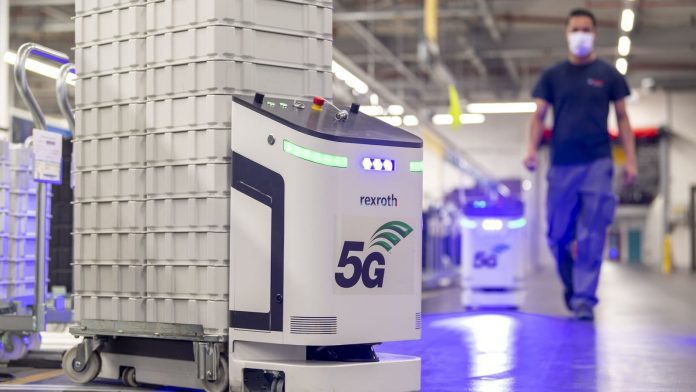Bosch has put live a private 5G network with Nokia at its factory in Stuttgart-Feuerbach, and confirmed another at its research campus in Renningen. The firm said it will “gradually” deploy 5G in all 250 of its factories around the world.
Bosch has been arguably the noisiest champion of 5G among the industrial set. It was among the very first to acquire a ‘vertical’ spectrum licence from German regulator BNetzA, to run factory operations in local chunks of the 3.7-3.8 GHz band in Germany. The Stuttgart-Feuerbach site is the company’s flagship Industry 4.0 plant.
It is also in the process of constructing a private 5G network at its semiconductor factory in Reutlingen, in Baden-Württemberg in Germany, to test for Industry 4.0 compatibility and network optimisation, along with industrial partners including ABB, Ericsson, Orange, and T-Systems. The Reutlingen rollout is part of the 3GPP’s three-year ‘5G-SMART’ smart manufacturing trials, which started in the middle of 2019, to help with development work for Releases 17 and 18 of the 5G NR standard.
The new innovation centre in Renningen, announced as the next-stop in Bosch’s 5G factory tour, was opened last year, the first in a run of investments to help the firm deliver €1 billion incremental revenue per year by 2022 from using and selling its own Industry 4.0 solutions. It has confirmed it is to launch its first “5G-capable products and… first solutions for industrial use”. Bosch Rexroth’s ctrlX Automation platform is designed for 5G.
The company’s interests in 5G are two-fold, both geared around driving business performance: to help to connect and animate its own hyper-efficient ‘factories of the future’, and to drive sales of its new 5G industrial componentry into other factories, as well as to the automotive market, where it has a stronghold.
Bosch has set out a vision for a 5G-enabled factory where every part of the production environment is fluid, except for the floors, walls, and ceilings. Industrial machines, devices, and vehicles will be made mobile by 5G and made intelligent by edge and cloud based analytics, enabling factory owners to change production according to demand.
The private network at Stuttgart-Feuerbach features eight small-cell base stations, covering around 10,000 square metres. Bosch worked with Nokia on the setup. It said: “While Bosch defined use cases, Nokia provided the components. The two companies are jointly responsible for network planning, operation, and servicing.”
It is working with Nokia and other partners on a new research project into how AI can simplify the operation and maintenance of 5G campus networks. The project, called Artificial Intelligence for Campus-Communication (KICK), is funded by the German Federal Ministry for Education and Research (BMBF).
It said its manufacturing operation at the site will work “under previously-unheard-of conditions”, with “ultra-reliable, ultra fast” data transfers making possible wireless support ‘critical applications’. It said: “Without exception, people and machines will be able to cooperate safely and without barriers.”
Subscribe now to get the daily newsletter from RCR Wireless News
Its new ActiveShuttle system for autonomous transport, first shown at Hannover Messe in 2019, has been deployed at the site. The system works with 5G networks, as they are available, and Wi-Fi and LTE otherwise. It gives reign to mini automated guided vehicles (AGVs), which can collect and move warehouse ‘dollies’ (trolleys), equipped with small load carriers (SLCs), around facilities without human involvement.
They are programmed via a hub control platform, and are able to carry SLC loads of up to 260kg autonomously through a production facility, avoiding people, other vehicles, and fixed factory infrastructure as they go. ShuttleS can be programmed to follow new routes and layouts. ActiveShuttle runs a number of transport concepts, ranging from cyclical to consumption-based material supply systems.
The system can be implemented without adapting existing factory infrastructure, it said. Bosch has been pitching the system to the likes of BMW, Osram, and Trumpf, customers for its industrial IoT solutions already. Its strategy is to digitise and connect all 280 of its own production plants, and sell the technologies it has honed in the process to customers.
Michael Bolle, chief digital officer and chief technology officer at Bosch, said: “5G strengthens our competitiveness and lets us make even more of Industry 4.0’s potential. We will gradually roll 5G out to our roughly 250 plants around the world… Campus networks are an important building block for Industry 4.0. [They] give us control – over what happens in the factory and over how data is transferred both within and beyond the factory walls.”
Rolf Najork, member of the Bosch board of management, said: “We have a clear vision of the factory of the future, and how we need to develop our products to meet its requirements. In this context, 5G is a ‘springboard innovation,’ a technology that will fundamentally change the market…. We are forging new paths and bridging the gap between control systems, IT, and the internet of things.
“Our new control technology will use the new mobile communications standard to connect a wide range of devices… Anyone looking to seize the potential of the new mobile communications standard in factories needs not just 5G networks but also equipment and machines that interact wirelessly. Bosch is making products 5G-capable.”
Capgemini reckons 65 percent of industrial companies will deploy 5G within the first two years of availability, according to Bosch. It quoted other stats that there will be up to 70 billion connected devices worldwide by 2025, with an increasing showing in industrial sectors.
The firm highlighted its work in various 5G research clubs, including the 5G-ACIA initiative to “shape 5G” so it meets the needs of the manufacturing industry “from the outset”, the international 5G-SMART association to investigate the impact of 5G on semiconductor production, and the 5G NetMobil project around “fully connected driving “.

